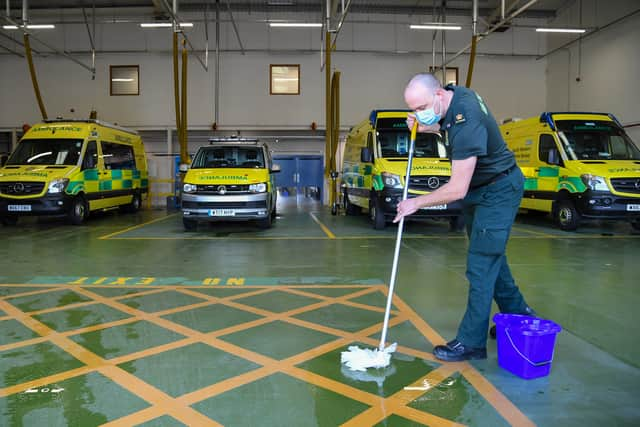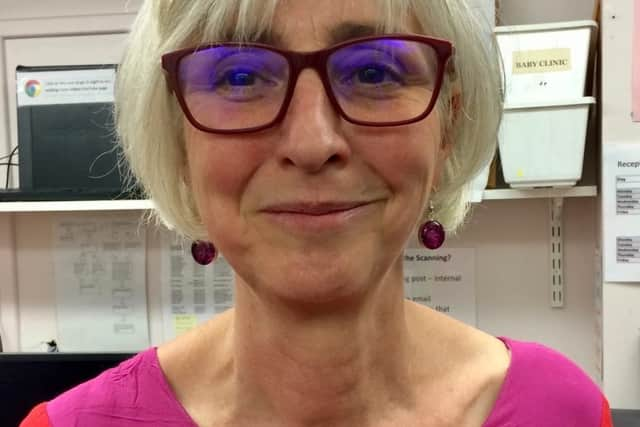‘Chronic nurse shortages’: London suffering worst NHS staffing crisis in England, figures reveal
and live on Freeview channel 276
London is suffering “chronic nurse shortages” amid the worst NHS staffing crisis in England, a top cancer charity has warned.
Vacancies for nurses and general NHS staff are higher in the capital than in any other region, new data from NHS digital has shown.
Advertisement
Hide AdAdvertisement
Hide AdThe shortfall comprises 9,494 nurses, or 12.8% of the nursing workforce, and 26,000 general NHS staff posts, or 10.9% of the total workforce - both higher than any other region.
Emma Tingley, from Macmillan Cancer in London, warned: “Chronic nurse shortages in London are the highest in England and prevent cancer patients from having their emotional, financial, and practical concerns heard and addressed.”


And Dr Jackie Applebee, an NHS doctor in Tower Hamlets, said: “Hospitals and GPs are dealing with backlogs all while there is a massive workforce shortage in the NHS of over 100,000 vacancies, or over 10%.
“People are absolutely exhausted and burnt out. People are leaving and people who are coming up to retirement age are thinking ‘I’m going to go now’.
Advertisement
Hide AdAdvertisement
Hide Ad“It’s why NHS vacancies are rising. People haven’t got much fuel left in the tank.”
The NHS in London said it was committted to reducing nursing vacancies.
NHS Digital statistics show across England, as of March 2022, nurse vacancies in the south east were at 10.9% of the workforce; 10.8% in the midlands; 10.6% in the east of England; 8.1% in the south west; 7.8% in the north east and Yorkshire; and 7.7% in the north west.
Loading....
While in terms of overall staff vacancy rates, the east of England, the midlands, and south west were all at 8.2% of the total workforce; the north west and the south west were at 6.4%; and the north east and Yorkshire was at 6.1%.
Advertisement
Hide AdAdvertisement
Hide AdIt comes as Macmillan says it is investing £6m this year alone to help “stop cancer patients falling through the cracks”.
The charity says the shortage of frontline nursing and general staff can undermine the quality of care and lead to longer delays, not just for cancer patients but for all patients.
Leukaemia patient, Keyur Patel, now 40, was diagnosed with the disease aged 31.
Mr Patel, known as ‘Kiwi’, of Hounslow, west London, said: “Cancer is an enormous learning curve from day one. Everyone’s different but for me it really affected my mental health.


Advertisement
Hide AdAdvertisement
Hide Ad“I think it’s really important when dealing with people at their most vulnerable to look past the condition and treat them as an individual.
“There is a saying that when you treat a disease, you either win or lose but when you treat a person it doesn’t matter what the outcome is - you’ll always be successful.”
Ms Tingley added: “Macmillan continues to support NHS staff and people with cancer as much as possible and is currently investing £6 million across the capital to fund new roles and services to help stop cancer patients falling through the cracks.
“Now it is up to the government to invest in a fully costed cancer workforce strategy to ensure the right workforce, size and skills mix are available.
Advertisement
Hide AdAdvertisement
Hide Ad“Finally, increased funding is needed to provide succession planning for nurses to become cancer specialists.


“This is the only way to ensure that the individual needs of people with cancer are met.”
And of the workforce shortage, Dr Applebee said: “There will be areas where it’s more pronounced than others - where it’s really understaffed and they’re relying on agency and bank staff which is so much more expensive.
“It’s much better to have in-house staff who know all the systems and the patients.”
Advertisement
Hide AdAdvertisement
Hide AdShe continued: “The government needs to not just pay lip service, but absolutely, practically recognise the fantastic contribution the NHS makes to the health and welfare of this country.
“It’s unique, free at the point of delivery and was brought in in place of fear in the 1940s.
Loading....
“Now people do not have to fear going to the doctor or seeking healthcare.
“What the government needs to do is get off their political high horse, put their ideology aside and they need to properly bring it back into the public sector.
Advertisement
Hide AdAdvertisement
Hide Ad“It needs to be publicly funded and provided and free at the point of delivery.
“We need to get rid of the market in healthcare which fragments it and just let us get on with working together as one national system for the best treatment of our patients.”
An NHS London spokesperson said: “The NHS in London is committed to reducing nursing vacancies, through increasing wellbeing support, international recruitment and the launch of a nursing and midwifery retention self-assessment tool which focuses on evidence-based interventions that have the greatest impact on the retention of nurses and midwives.”
And a spokesperson for the Department for Health and Social Care (DHSC) said: “The NHS workforce is growing – compared to last year there are over 4,000 more doctors and over 9,600 more nurses working hard across the NHS to bust the Covid backlogs and improve outcomes for cancer patients, with almost 1,300 more nurses working in London.
Advertisement
Hide AdAdvertisement
Hide Ad“We are improving outcomes for cancer patients across England and overall cancer treatment has been maintained at over 97% of pre-pandemic levels, with 94% of people starting treatment within a month.
“Our plan to bust the Covid backlogs and reduce cancer waiting times includes rolling out up to 160 community diagnostic centres across the country, over 90 of which are already open and over one million additional scans have been delivered so far.”
For support, call the Macmillan helpline on 0808 808 00 00 or visit macmillan.org.uk.
Comment Guidelines
National World encourages reader discussion on our stories. User feedback, insights and back-and-forth exchanges add a rich layer of context to reporting. Please review our Community Guidelines before commenting.
